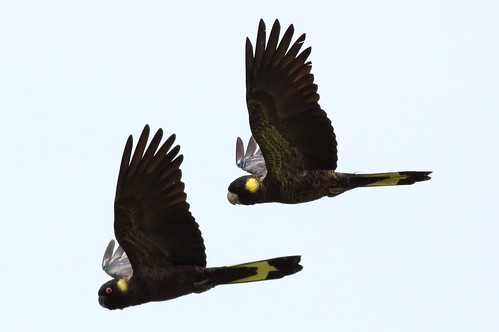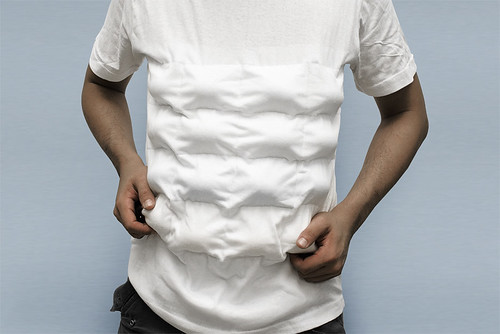 Yellow Tailed Black Cockatoos pictured at Edithvale wetlands. Image by Wayne Butterworth
Yellow Tailed Black Cockatoos pictured at Edithvale wetlands. Image by Wayne Butterworth
AN INTERNATIONAL crime syndicate based in northern Victoria is making millions of dollars smuggling endangered and exotic bird eggs in and out of the country.
The Sunday Age believes that an investigation, code-named Operation Janitor, involving federal and state wildlife authorities has disrupted the gang's operations.
Homes have been raided and more than a dozen syndicate members interviewed, with charges expected to be laid within weeks.
The syndicate, whose members include well-known licensed bird keepers, uses couriers wearing specially-modified vests and underwear to carry up to 500 exotic bird eggs into Australia every month, with a courier able to carry 30 to 50 eggs at a time.
Profits from one overseas trip are said to be more than $300,000.
Investigators say the couriers, some in wheelchairs in a bid to avoid suspicion, travel mainly to South Africa, the Philippines and Singapore, where they exchange native eggs for exotic eggs prized by Australian collectors.
 Egg smuggling another threath to Australia's biodiversityThe eggs of endangered Australian red, yellow and white-tailed black cockatoos, glossy black cockatoos, Major Mitchell cockatoos, gang-gang cockatoos, galahs and lorikeets are the most sought-after by international collectors. A recent wildlife investigation in Britain found the value of a red-tailed black cockatoo was now $100,000 on the black market.
Egg smuggling another threath to Australia's biodiversityThe eggs of endangered Australian red, yellow and white-tailed black cockatoos, glossy black cockatoos, Major Mitchell cockatoos, gang-gang cockatoos, galahs and lorikeets are the most sought-after by international collectors. A recent wildlife investigation in Britain found the value of a red-tailed black cockatoo was now $100,000 on the black market.
Investigators say many of these native bird eggs are sourced from Victoria, including the Pine Plains area of Wyperfeld National Park, 450 kilometres north-west of Melbourne. The eggs are stolen from nest hollows during the bird breeding season from September to December.
The native eggs are exchanged overseas for the eggs of rare and exotic birds such as macaws, moluccan and umbrella cockatoos, Amazon parrots and conures.
These eggs are smuggled back into Australia where the syndicate enlists mainly women with either a nursing or animal husbandry background to hand raise the birds after the eggs have hatched. The birds are then sold on the black market for as much as $100,000.
The syndicate stores the bird eggs in safe houses in northern Victoria and disguises its operations using legitimate bird breeding businesses as a front.
Department of Sustainability and Environment wildlife officer Mike Sverns has compiled briefs of evidence against crime syndicate members, which are now being reviewed by the Commonwealth Director of Public Prosecutions office. "This is not a petty offence. We regard this as a serious wildlife crime. A crime against the state," Mr Sverns said.
The Sunday Age has been told intelligence gathered by the Department of Sustainability and Environment, Customs, and the Department of Environment, Water, Heritage and Arts has found the continuing criminal enterprise in northern Victoria is part of an established network of international traffickers in eggs of high-value wildlife.
The activities of the syndicate have serious implications for biodiversity through both the direct impacts on wild populations of taking the eggs, and the threat of the introduction of disease. There is no legitimate market for the eggs of wildlife in Victoria or Australia.
Mr Sverns said wildlife officers had confirmed the trafficking had been operating for at least five years.
One courier, French national Pascal Rene Della Zuana, 48, was jailed for two years and fined $10,000 in 2007 after being caught trying to smuggle 23 exotic bird eggs into Australia from Bangkok.
He was found to be wearing a modified singlet that held an array of exotic bird eggs.
Importing an endangered species into Australia carries a maximum penalty of 10 years' jail and a $110,000 fine.
Customs national manager for investigations Richard Janeczko said wildlife smugglers preferred bird eggs to live animals because they were easier to smuggle.
"Egg smuggling has grown over the years, but it's been a traditionally smuggled commodity for a long time," Mr Janeczko said. "When people are smuggling birds they tend to smuggle as many eggs as they can because you don't have to worry about feeding them and they're easier to protect."
The illegal smuggling of wildlife is said to be worth between $US5 billion and $US15 billion ($A6.8-$A20.5 billion) a year.